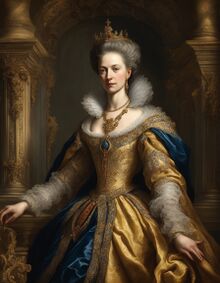Katherinicanism
This article is incomplete because it is pending further input from participants, or it is a work-in-progress by one author. Please comment on this article's talk page to share your input, comments and questions. Note: To contribute to this article, you may need to seek help from the author(s) of this page. |
| Part of a series on |
| Saletrism |
|---|
|
Priests |
|
Denominations |
Katherinicanism is a Heldervinian Saletrist tradition which developed from the Saletrist Reformation of 1680, following Katherine III's refusal to acknowledge Defender of the Faith Cassandra III as the head of Saletrism, which in turn stemmed from Katherine's desperation to produce an heir to the throne. Adherents to Katherinicanism are called Kathericans.
Terminology
The word Katherinicanism originated from the name of Katherine III as a complimentary term, in part due to the fact that Katherine was the serving monarch of the Heldervinian City-states.
History
Katherinicanism has its roots in the reign of Katherine III, who, in 1680, at the age of fifty, was desperate to produce a living heir to the throne, and subsequently demanded that Defender of the Faith Cassandra III grant her the right to marry a second husband, as her marriage to Isaac of Möller bore no surviving heirs. When the Defender of the Faith refused, Katherine declared that she was in absolute authority of Saletrism in the city-states, casting off the authority of Cassandra and allowing her to have a second marriage.
